 Passover’s Message of Hope in the Aftermath of Oct. 7
Passover’s Message of Hope in the Aftermath of Oct. 7
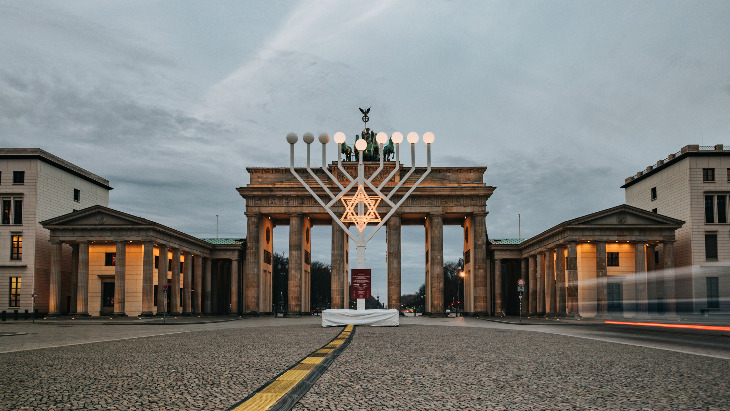

6 min read
Traveling between monuments to history and finding signs of Jewish life along the way.
It was 100 degrees out and I couldn’t ask for water. That was not a rule or a punishment, it was more of an internal moral decision because of the space in which I found myself: Sachsenhausen Concentration Camp.
Though only two barracks remain standing, even surviving an arson attack in the 1990s, the layout of the camp is still clear. It was never a site of large swaths of shade or spacious living quarters. It was always uncomfortable, and the thirst of its prisoners was certainly unmatched. I was thirsty and uncomfortable, but another water bottle and an air-conditioned bus awaited me in less than three hours’ time. I had no right to complain in that place.
Concentration camps were what I knew about Germany before I ever arrived. I knew schnell and the swastika. I knew about the horrors of World War II, the building of the Berlin Wall, and that my grandmother always said it was a country she would never visit. But time, and Germany itself, had promised change, and I flew across the ocean prepared to find it.
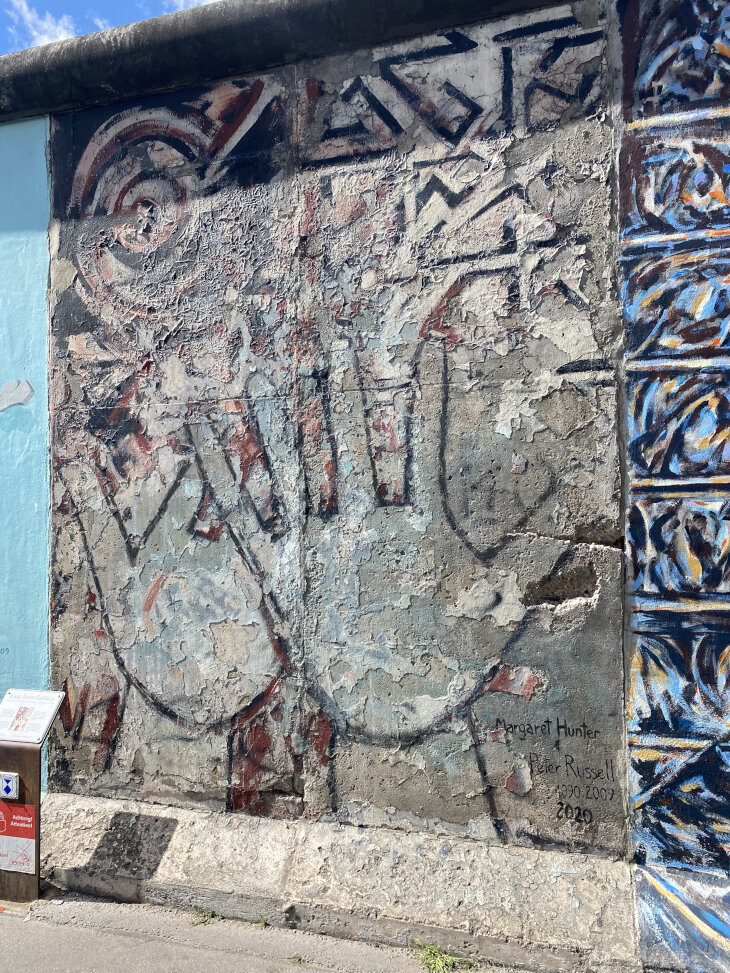 At the Berlin Wall
At the Berlin Wall
Germany Close Up is a program, funded through a grant from the German government, that brings North American Jewish young adults to Germany to encourage dialogue and offer encounters with a country beyond its very worst moment.
The itineraries change, depending on the time of year and partner organization (I attended with Pittsburgh-based Classrooms Without Borders). However, it is no surprise that many talks, tours, and excursions focus on the Holocaust and what Germany has done since to commemorate the victims or take responsibility for its violence and complicity. We visited the Memorial to the Murdered Jews of Europe, The Memorial to the Sinti and Roma, The Bavarian Quarter, where the Old Synagogue stood, where the New Synagogue stands, where the Jewish Cemetery was, and all the stumbling stones (brass plates laid into the pavement near the last voluntary place of residence of Nazi victims) in between.
No matter where you were in Berlin there was a reminder of the history we all know if we are willing to look at it.
What was harder to find were signs of Jewish life. If you want to really feel what it’s like to be a Jewish minority, go to Germany. Every panel we spoke with highlighted the extra effort it takes to find other Jews, to participate in Jewish institutions, to find kosher meat. But just because it was hard, doesn’t mean life wasn’t there.
Our 24-person group joined the Fraenkelufer Synagogue in Berlin for Friday Night Shabbat services. The dividing lines that exist between orthodox, conservative, and reform synagogues in the United States were not present in our service in Germany. It was a patchwork of traditions that held moments of recognition for everyone. While men and women sat separately there was no mechitza physically dividing the space. Half the tunes to familiar prayers were ones I knew; the others were not. While I’d never had fish stewed with tomatoes for dinner before, the singing and comradery at Shabbat dinner were all completely familiar.
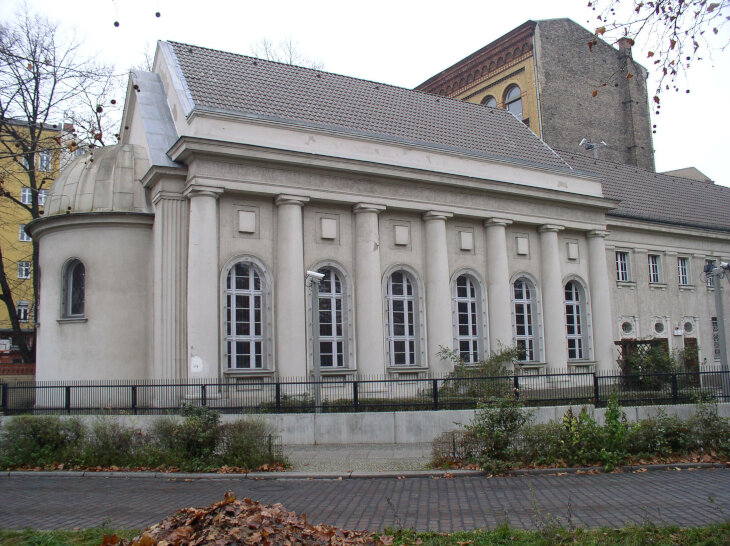 The Fraenkelufer Synagogue
The Fraenkelufer Synagogue
That night, in a place of life, a place of modern Jewish life in Germany, I felt joy. The question in my mind, however, after Sachsenhausen, and memorial after memorial, and, perhaps, even more importantly, the empty places where memorials were missing, was: Is Germany a place where I am allowed to find joy?
I know, despite the schedule that leaned heavily on the past instead of the present, that Germany Close Up very much wanted us to see moments like the one I found at Fraenkelufer. But I also know I was not just defying my grandmother’s warning but both attitudes past and present by wearing my chamsa for the entirety of my trip. When we spoke to a rabbi in Munich he admitted to always wearing a cap over his kippah when he was out in public.
When the most recent fighting in Gaza broke out I was away from any television or social media update. It wasn’t until I got on a plane to fly home that I read in any detail about the current wave of attacks. While I missed the breaking news, Israel was very much on my mind as I walked through Berlin, Nuremberg, and Munich. Both tour guides and experts answered questions about modern antisemitism, but not once did any of them use the word antizionism. They only spoke of anti-Israel antisemitism.
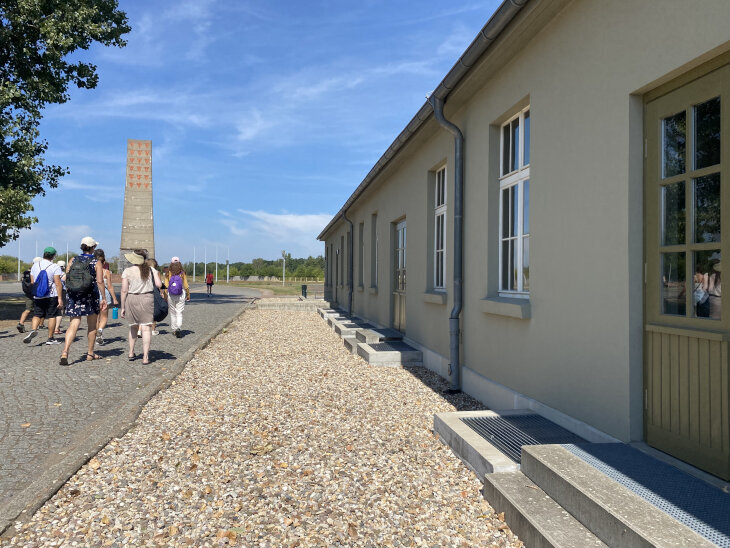 Sachsenhausen Concentration Camp
Sachsenhausen Concentration Camp
In Germany, they did not use a word to soften certain antisemitic tendencies. When it came to delegitimizing, demonizing, or any double standards that were raised against Israel, antisemitism is what it was called. Anyone can use legitimate criticism to talk about the Israeli government, but there is a clear line, in the words used in Germany, that does not exist in the United States. It is important to also note that Holocaust denial is illegal in Germany.
In the same way you cannot yell fire in a crowded theater, in Germany you are not allowed to blatantly and vocally deny the history of the Holocaust. This, like the existence of the active and joyful community at the Fraenkelufer Synagogue, are clear examples of time and change, exactly the parts of modern Germany I am certain the Germany Close Up program wanted us to see. But I also saw a larger narrative.
The day after attending services I visited the Pergamon Museum, the famous home to the reconstructed Ishtar Gate of Babylon. It wasn’t only a day after services, it also happened to be August 6, or Tisha BAv, when many Jews commemorate a number of disasters in Jewish history, including the Babylonian exile. And, while the Babylonian gate was in a museum, I, and the congregation at Fraenkelufer, were very much still alive and thriving outside of it.
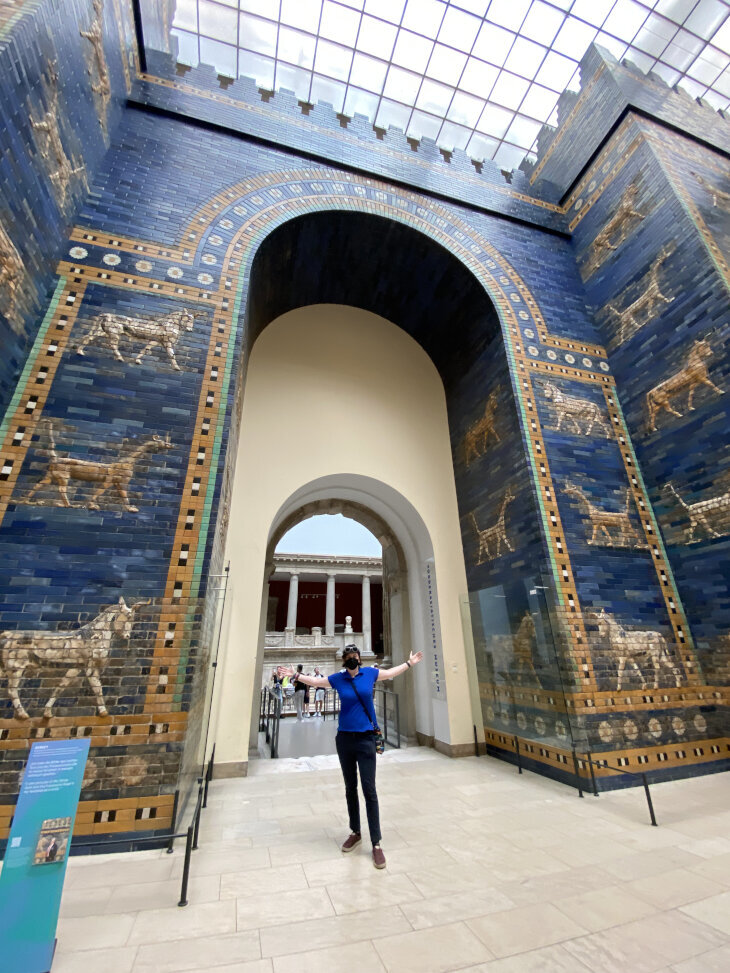 Me at the Ishtar Gate
Me at the Ishtar Gate
The struggle is real, but so are the successes. There are more ways and more stories to interact with when it comes to history, and we have barely scratched the surface.
My grandma didn’t want me to come to Germany because of the stories she knew. It’s important I went so I could bring back some stories of my own.
